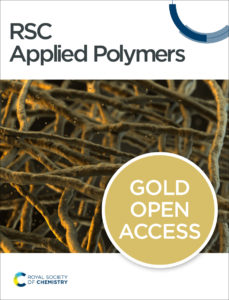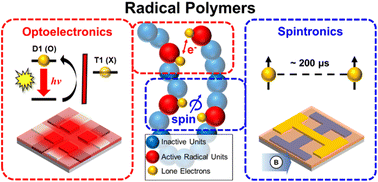RSC Applied Polymers has published its first articles. To celebrate this we wish to introduce some of our #RSCAppliedfirst50 authors and their recently published articles.
In this post we feature the contributing authors for the article ‘Radical Polymers in Optoelectronic and Spintronic Applications’
An Introduction to ‘Radical Polymers in Optoelectronic and Spintronic Applications’ by Bryan W. Boudouris and Hyunki Yeo.
This manuscript provides a status update regarding stable open-shell macromolecular materials. Radical polymers stand apart for their potential as solid-state conducting materials, due to their distinct charge transport mechanism, promising optical properties, and paramagnetic open-shell structures derived from their singly occupied molecular orbital energy levels. Beginning with an exploration of their synthetic methods and the underlying charge transport mechanisms, the discussion then shifts to the significant development in solid-state optoelectronic materials. Ultimately, the discussion concludes by highlighting the emerging roles of these materials in spintronic applications, showcasing their recognition especially within the context of next-generation quantum information systems. In conclusion, callouts are sent out for various research communities to dive into open-shell macromolecules, with the aspiration that this effort offers essential contexts and references to stimulate advancements in this field. This approach seeks to unleash the full potential of radical polymers (and organic radicals in a wider scope), in terms of pioneering scientific contributions and societal influence.

Professor Bryan W. Boudouris
Bryan W. Boudouris is the R. Norris and Eleanor Shreve Professor in the Charles D. Davidson School of Chemical Engineering and a professor (by courtesy) in the Department of Chemistry at Purdue University where he is also the inaugural Associate Vice President for Strategic Interdisciplinary Research. He recently served on an Intergovernmental Personnel Act (IPA) assignment as a Program Director in the Division of Materials Research at the National Science Foundation from 2020-2022. He received his B.S. in Chemical Engineering from the University of Illinois at Urbana-Champaign in 2004. After receiving his Ph.D. in Chemical Engineering from the University of Minnesota in 2009, he conducted postdoctoral research from 2009 to 2011 at the University of California, Berkeley and Lawrence Berkeley National Laboratory. Since joining Purdue University in 2011, he has been the recipient of a number of awards including the AFOSR YIP award, the DARPA YFA, the NSF CAREER Award, the AIChE Owens Corning Early Career Award, the Saville Lectureship at Princeton University, and the John H. Dillon Medal from the APS.

Dr Suman Debnath
Suman Debnath is currently a postdoctoral researcher in the Charles D. Davidson School of Chemical Engineering at Purdue University. He obtained his B.Sc. Degree in chemistry from the University of Burdwan in 2011 and his M.Sc. degree in Organic Chemistry from Visva-Bharati University, Bolpur, Santiniketan in 2013. He received his Ph.D. degree in Polymer Sciences from Rajiv Gandhi Institute of Petroleum Technology (An institute of national importance, Government of India) in 2020. His current research focuses on polymer functional materials and photoelectric devices.

Dr Baiju P. Krishnan
Baiju P. Krishnan received his M.S. degree from the University of Calicut, India in 2008. He later completed his Ph.D. at the Indian Institute of Science Education and Research Thiruvananthapuram (IISER TVM), India, under the supervision of Professor Kana M. Sureshan in 2017. He was a postdoctoral researcher at Leibniz Institute for New Materials (INM)- Saarbrücken, Germany (2017–2020) and Martin Luther University of Halle-Wittenberg (MLU), Halle, Germany (2021–2022). He is currently a postdoctoral researcher at Purdue University. His research interests include supramolecular chemistry, stimuli-responsive polymers, and chemical reactions in confined environments.

Hyunki Yeo
Hyunki Yeo, born in Seoul, South Korea, demonstrated early interest in chemical engineering, commencing his educational journey at Korea University. Following mandatory military service at Capitol Defense, he pursued an M.S. degree at the same institution under the guidance of Dr. Joona Bang and Dr. Anzar Khan. He joined Purdue University for his doctoral studies in 2020. His research focus encompasses polymer synthesis, characterization, and applications.
Radical polymers in optoelectronic and spintronic applications.
Hyunki Yeo, Suman Debnath, Baiju P. Krishnan and Bryan W. Boudouris.
RSC Appl. Polym., 2024, Advance Article. DOI: 10.1039/D3LP00213F
 |
RSC Applied Polymers is a leading international journal for the application of polymers, including experimental and computational studies on both natural and synthetic systems. In this journal, you can discover cross-disciplinary scientific research that leverages polymeric materials in a range of applications. This includes high impact advances made possible with polymers across materials, biology, energy applications and beyond.
|



